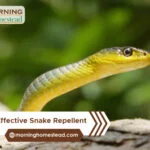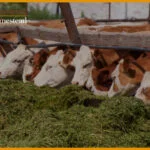Last Updated on June 7, 2023 by Georgie Smith
It is a burden for a farmer to not only keep his horses alive, healthy, and safe but part of that consists of controlling weeds. Some weeds grow in horse pastures that are poisonous to horses. Therefore, it is vital that you maintain your fields to ensure the unsafe weeds are not a threat.
When managing horses, controlling weeds is the leading concern and the most urgent decision to consider while managing your pastures. Weeds are typically less edible, less dependable, and less nutritious for forage to horses than the pasture species replaced.
Basic Comparison:
SSL
Storage
Domains
Sub-domains
Crossbow Herbicide
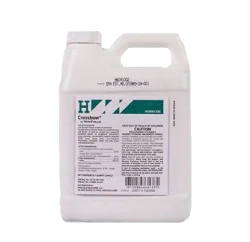
Crossbow
1 Gallons
Spray
Triclopyr, Herbicide
Gordon corp 7171122
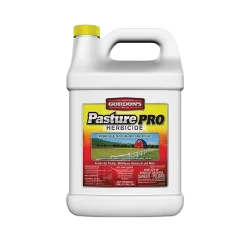
Gordons
47.5 Pounds
2.5 Gallons
15000 square feet
Amine Weed Killer
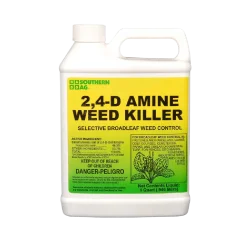
Southern Ag
32 Ounces
948 Milliliters
Liquid
Beings several weeds is not good for horses; it is more practical to group these weeds based on the life span. These are:
- Biennials
- Perennials
- Annuals
The Lifespan of Pasture Weeds
Biennials
For a biennial to complete its life cycle, it takes two years. The biennials form a small rosette to store its food in their roots the first year, then flower the second. Control measures, mechanical and chemical are the most effective if applied throughout the first year’s growth.
For any reason, you delay the treatment until the second year, applying an herbicide early season is vital.
Perennials
Perennials are a bit trickier in that they live more than just two years and they re-grow from the same roots each year. These weeds move nutrients into their roots through fall to the well-developed and active growing foliage.
As the roots absorb the nutrients, so will the chemical. Applying herbicide in the spring, or often moving during the summer is an excellent technique for controlling growth until fall arrives. However, it may take a few growing seasons if all you do is mow to control these weeds effectively.
Annuals
Annuals do their germinating from a seed, matures then dies all in less than a single year. Using chemical control for annuals works best when you apply it in the spring when active, new weeds grow. Mechanical control, like mowing, is highly effective against annuals.
Minimizing Weeds in Pastures With Herbicides
First and foremost, when you use herbicides, be sure always to read and apply the instructions accordingly. Be sure to follow grazing recommendations always after an herbicide application. Herbicides have a way of making toxic weeds tastier to horses.
Therefore, its best to keep the horses away from the sprayed area for seven to ten days, especially if there are poisonous plants present. Keep in mind, herbicides alone will not create a weed-free pasture. A large majority of herbicides control either broad leaves or grasses.
If your pasture has a mixed variety, such as legumes and grasses, there are no remedies that will leave both while controlling unwanted weeds.
The purpose of this review is to help consumers narrow down The 5 Best Weed killers For Horse Pastures That Won’t Harm Your Animals. Our mission is not to favor a product or maker but to research and present you with the best-sellers.
The 5 Best Weed killers For Horse Pastures That Won’t Harm Your Animals
Crossbow Herbicide 1 gallon
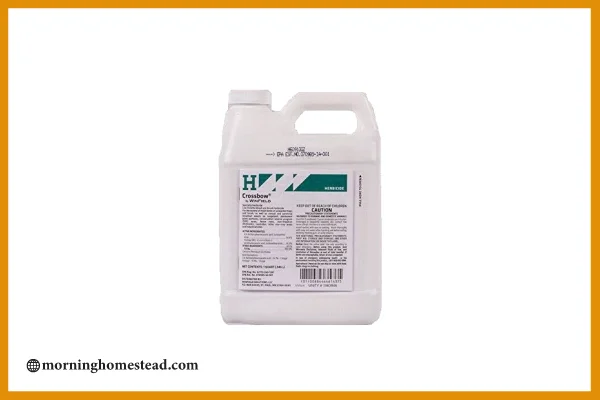
First on the list is this Crossbow Specialty Herbicide. Its purpose is for controlling the general population of perennials and annuals broadleaf weeds and woody plants. The Crossbow product works on the following:
- Permanent grass pastures
- Rangeland
- Fence rows
- CRP
- Roadsides
- Non-irrigation ditch banks
- Industrial sites
- Non-crop areas
This herbicide comes in one and two-gallon containers which you can view by clicking here.
Gordon Corp 7171122 Gordon’s, 2.5 Gallon, Pasture Pro Plus Weed & Feed

The second is this Gordon Corp Pasture Pro Plus Weed and Feed. This effective concentrate of 15-0-0 combo of liquid fertilizer and herbicide for pastures has a proven success rate of clearing pastures. The dynamic duo of 15 percent nitrogen and 2, 4-D herbicide successfully eliminates weeds while fertilizing all in one simple step.
The three main features of the PBI weed and feed:
- No waiting between grazing and application
- Improves the quality of forage in pastures
- Effectively treats 20,000 square feet
Be sure if you want to effectively weed and feed your pasture to check out the product. You can read additional information by clicking here.
Southern Ag 2, 4 – D Amine Weed Killer, 1 Quart
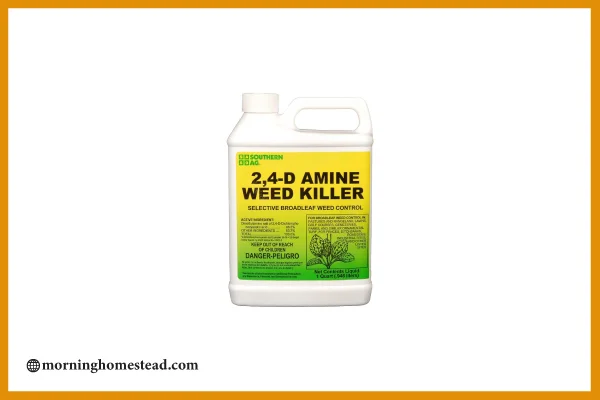
Next is this Southern Ag 2,4- D Amine Weed Killer that has a low, economical usage rate of one to four pints per acre. The Southern Ag controls many of the broadleaf weeds and woody plants that seem never to go away.
The following are areas where you can use this product:
- Pastures
- Ditch banks
- Fences
- Turfs
- Golf Courses
- Small Grains
- Corn
This item is 3.8 lbs. Per gallon herbicide with 2, 4-D acid equal concentrate in liquid, low volatile form. The Southern Ag is successful in controlling broadleaf weeds. Add two-three tablespoons to three to five gallons of water for coverage of 1,000 sq. Ft.
You can order this product as well as read additional information by clicking here.
Remedy Ultra Herbicide Weed Control
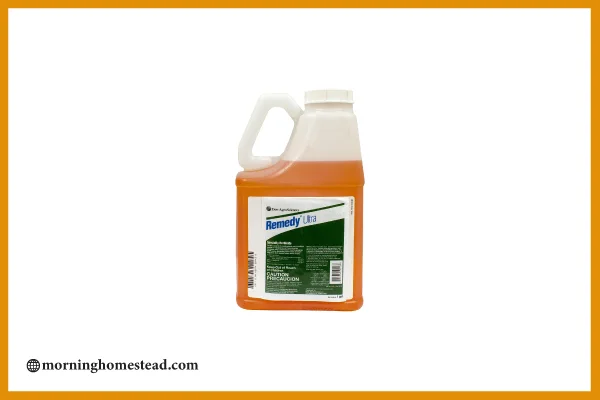
The Remedy Ultra Herbicide Weed Control is a one-gallon herbicide remedy for range and pastures. If you are searching for an economical avenue to reclaim your pasture and increase grass productivity, this is your product.
Remedy TM is the perfect solution for pasture regeneration and has a low residual alternative to removing weeds mechanically. One other bonus for this product is it ensures a low environmental impact.
If this product sounds like one that may work for you, click here to place your order today.
Monterey LG5482 0.5 PT Thistledown, 8 Fl oz

If you are looking for a herbicide that provides you with selective control of pesky broadleaf weeds in permanent pastures and rangeland, this is the one. The eight-ounce container of concentrated herbicide treats ½ to 2/3 acre.
The Monterey Thistledown herbicide eliminates the following weeds:
- Musk Thistle
- Thistle
- Knapweed
- Yellow starthistle
There are other weeds you will not need to worry about in non-crop areas and home pastures. The Monterey Thistledown controls Oxalis and has no grazing restrictions. To learn more about this product and how to order yours today, click here.
How To Minimize Weeds in Pastures
There are several steps to take to minimize weeds in and around your pastures, and these are:
- Incorporating proper grazing management is a necessity. If you overgraze, you can quickly and permanently damage your fields. When overgrazing, it often pulls out the roots of welcomed plant species, allowing weed space to take over.
- Supply extra protection to new seedlings until they fully form then moderately graze after that.
- After grazing, be sure to give developed pastures an adequate recovery period. That reduces weeds while increasing nutritional value and yield.
- When possible, after each grazing period, mow to help keep numerous pasture weeds while encouraging pasture growth. Caution: never mow the pasture over four inches directly above the soil.
- Remove your horses from the fields if it becomes excessively wet or dry conditions.
- If your pasture with excessive weeds and forages runs low, your best bet may be to reseed.
- A well-maintained pasture with high yields will choke out unwanted weeds.
Overgrazing and the Damage it Can Cause
Overgrazing signifies a hazard to the environment where livestock or wildlife feed excessively on pasture. It also is the routine of grazing livestock on the vegetation before recovering from an earlier grazing condition, known as intensive grazing.
Otherwise, overgrazing happens when the pasture of vegetation treatment is too much and removed from the land without having adequate time to continue growth.
FAQs:
Q: What other reasons can cause overgrazing?
A: Lack of adequate animal control, Drought or lack of moisture, Improper pasture, and land use, overstocking, and poor irrigation just to name a few.
Q: Is it safe to use two herbicides at the same time?
A: It is never a good idea to mix chemicals for any reason unless the instructions state to do so.
Conclusion
As you can see, keeping a healthy pasture can be tricky. Your main concern should be the health of your livestock. Be sure whichever product you choose; you follow the directions carefully to prevent damaging your fields and causing your livestock to be ill.
We hope you enjoyed this article and find the perfect product in one of the five listed above. If you have any input, please drop us a comment below, and we will respond quickly. While you are here, please “like and share” our work to help us continue to grow.


